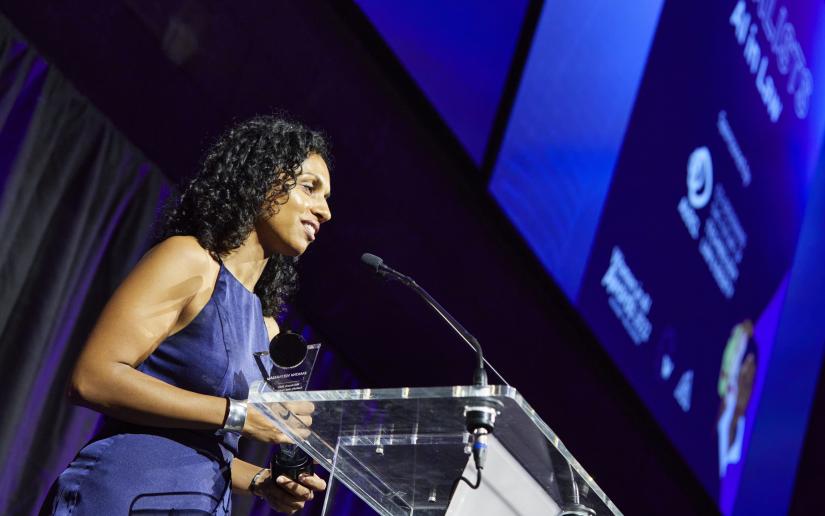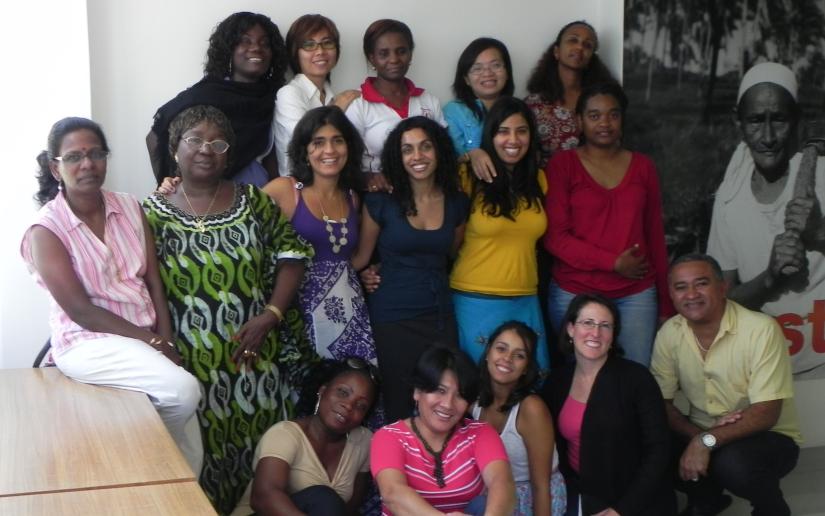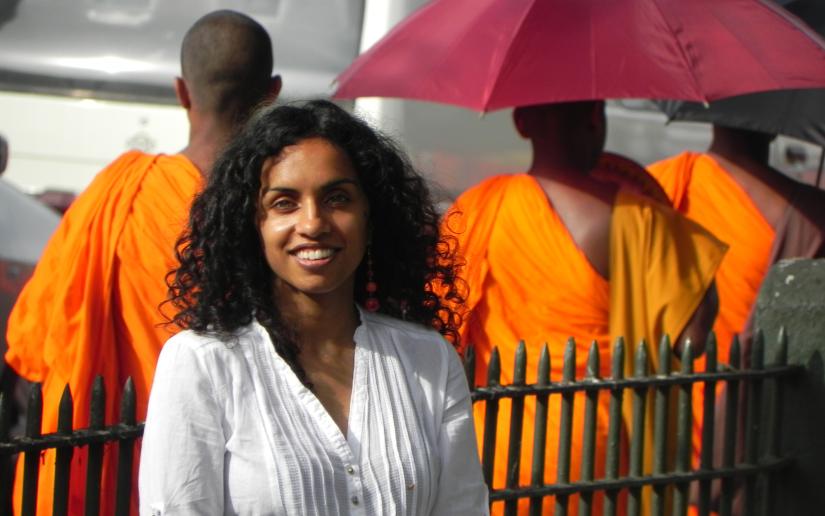Award-winning researcher Dr Ramona Vijeyarasa discusses how Australia could be a more just society, and how artificial intelligence may prove the best legal mind for tackling inequality.
Unbiased AI could improve women's rights

Dr Ramona Vijeyarasa accepts her Women in AI award at a ceremony in Melbourne in 2022. Photo supplied by Dr Vijeyarasa.
Dr Ramona Vijeyarasa is a researcher, a women's rights activist, and an individual seemingly undaunted by a challenge.
She’s been honoured for her pioneering work in artificial intelligence research by Women in AI, winning the Women in AI (Law) Award, and coming 2nd Runner-up for Women in AI Innovator of the Year.
The global advocacy group for women in the field recognised Dr Vijeyarasa for her innovation, leadership, global impact, and her ability to harness AI to provide social good for the community.
She is an associate professor and Head of the Juris Doctor Program in the UTS Faculty of Law.
Dr Vijeyarasa, bringing an AI perspective to law is a novel approach. How did your work come about?
I designed the Gender Legislative Index, or GLI, to be a tool to help lawmakers enact laws that actually take women’s rights into account, whether that is a law on equal pay or a law on climate change. But I knew my knowledge of international women’s rights law was only one part of the solution.
After knocking on many wrong doors, I came into contact with Rapido Social from the UTS Faculty of Engineering and Information Technology (FEIT), who work in pursuit of social justice, and the UTS Connected Intelligence Centre, who have world-class expertise on data visualisation and data analytics. We collaborated in the making of the GLI.
CONNECT WITH
Gender Legislative Index
It is the use of AI that makes the GLI unique. Thanks to an AI-driven algorithm, the GLI gives an overarching score for a law, free of much of the bias that humans bring to their evaluation of laws. All laws, irrespective of area, are treated similarly.
AI has helped bring integrity to the GLI and responds to a thirst for new ideas to re-assess what gender equality advocates have achieved through the law and what potential remains.
The GLI has now been applied to more than 130 laws from Australia, Indonesia, the Philippines and Sri Lanka.
Does Australia face the same problem with inequality embedded in our legislation?
Absolutely! Australia ranked 50th in the World Economic Forum’s Gender Gap Index in 2021, a fall from a rank of 15th in 2006, a reality that we should be far from proud about.
A major part of the problem is that we either unintentionally embed discrimination in our laws, or we fail to see how law can be better used to advance the interests of a greater diversity of Australian women.
Australia’s laws – from paid parental leave to laws on modern slavery – either embed gender stereotypes or ignore the importance of bringing a gender perspective to legal drafting altogether.

Dr Ramona Vijeyarasa at a workshop she ran in Rio de Janeiro, Brazil, in 2011, as Head of the Women’s Rights program at ActionAid. Photo supplied by Dr Vijeyarasa.
Your work and activism have taken you around the world. How have these experiences impacted you?
As a women’s rights activist, I have stood beside women farmers in Liberia, walked with women on candlelight vigils against domestic violence in Brazil, and listened to men and women from the floating villages of Cambodia talk about what they would like to see change in their local communities.
I have sat in the living rooms of activists and legislators from Sri Lanka, Indonesia and the Philippines, sometimes for hours, hearing about their experiences advocating for law reform and women’s progress in their countries.
These are rare and unforgettable experiences that shape how I see the world and the inequality that exists within it.
And you explore this inequality further in your new book?*
I have always been drawn to this interesting phenomenon of Asia having had a relatively high number of female leaders. My new book, The Woman President, explores whether women leaders make a difference when it comes to the laws enacted when they are in power, and how those laws affect fellow women.
I have always wanted to see women lead and I want to believe the world, especially for women, will be better when they do. For an academic piece of research though, I had to take a more neutral approach and look for the evidence either way.
How does UTS fit into that journey of affecting change?
I teach 1st year law students and I love that fresh perspective they bring to their study. I am often asked about my career path by young students who want to know more about an alternative career outside of corporate practice. When speaking with them, I am regularly reminded about the passionate (and let’s say naïve) belief I had as a young student that I was going to change the world as a human rights lawyer!
Decades on, maybe a little of that naivety remains. Wouldn’t it be great to develop something truly extraordinary that can help address gender inequality? I believe the Gender Legislative Index has the potential to make a small dent in the problem, so I am hoping to go global.
I would love for UTS to be home to a global repository of good practice laws that can actually make women’s lives better.

Dr Ramona Vijeyarasa on holiday in Sri Lanka in 2013. Photo supplied by Dr Vijeyarasa.
You’re clearly passionate about your research, teaching and activism – what brings you joy outside of work?
I spend a lot of time with my two young girls, aged 6 and 8, enjoying Sydney’s parks and beaches and going for long walks. I grew up in Sydney and my family is here so spending time with them on the weekends is really what brings me a lot of happiness.
I exercise regularly, and while I may not be planning another half marathon (yet), I do try to go running 3 - 4 times a week. It is really important for me to clear my head. I also love to cook. I am experimenting this year with cooking 1 new recipe a week. I am up to recipe number 11, I believe, so I may be a bit behind schedule!
*The Woman President: Leadership, law and legacy for women based on experiences from South and Southeast Asia is being published by Oxford University Press in July 2022.
If you have expertise in data analytics, data visualisation or film-making, and would like to get involved with the Gender Legislative Index, please contact Dr Ramona Vijeyarasa
